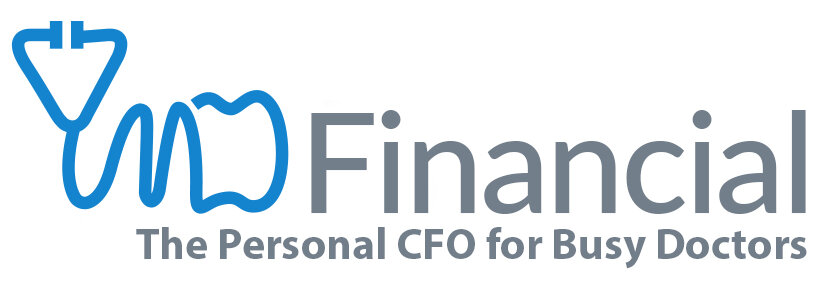Listen on Apple Podcast or Google Podcast
Trying to stay on budget with holiday spending is not the only financial issue doctors should consider at the end of every year. In this episode we’re discussing taxes, Roths, Required Minimum Distributions, and more. You won’t want to miss it!
First off, let’s discuss taxes. Do you know which tax bracket you are in? In the United States, we have a “stair step system”; as you go up the stairs, you pay more taxes. Here at MD Financial, we have created a “tax clarity tool” to help our clients save money on taxes by getting them into the lowest tax bracket, or the lowest “stair” possible. There are strategies we can help implement that will get you to a lower bracket, while still making sure that you are balanced adequately in the “tax triangle.”
One strategy to lower your taxes is Roth conversions:
Roth Conversions:
Convert your Pre-tax IRA funds to your Roth IRA
A strategy implemented to avoid the next higher tax bracket
Another strategy is to make sure that your retirement plan is evenly distributed among “tax now,” “tax later,” and “tax free” money:
Retirement Plan Funding
Check your work accounts. For most of our clients, we recommend the Roth option, if available
The exception would be a high earning doctor, in a high-tax state, like CA, NY, NJ or MN. Then we have to take a deeper dive and use the pre-tax option, or a combination
Roth IRAs
Direct Roth Funding
2020 IRS Income Limits:
Single making less than $124,000*
Jointly filing must be less than $196,000*
Deadline is April 15th, 2021
Few of our attending physicians qualify for this, but it is usually an option for our residents/fellows
Backdoor Roth Strategy
Many of our clients make over the income limit to do a Direct Roth contribution, therefore we recommend they utilize the Backdoor Roth strategy
We do need to have all paperwork finished and accounts funded by December 15th, 2020
Solo & Roth 401ks
These are a favorite among our doctors who are receiving 1099 income from their side gigs
These retirement plans can increase the amount of money going into the “tax later bucket,” or the “tax free bucket.” Click here to hear more about our tax buckets
Employee Contribution deadline for most clients is December 31st, 2020
Note that some accountants will allow you to contribute up to March 15th, 2021, and others up to April 15th, 2021—so check with your accountant to make sure you don’t miss the deadline
SEP/SIMPLE IRAs
IRS Limits for a SIMPLE IRA is $13,500 + $3,000 if you are over the age of 50
IRS Limits for a SEP IRA is 25% of net earnings, with a maximum of $58,000*
Deadline is April 15th, 2021
One other thing to note, as we end out the year, is your required distributions. If you’ve listened to our previous podcasts, you know we love pre-tax money, but there comes a day that Uncle Sam says that he’s waited long enough and wants his cut. When this time comes, we call the money pulled out Required Minimum Distributions (RMDs.)
RMDs
WAIVED for 2020
The age cutoff has been changed from 70 1/2 years to 72 years
Deadline is April 1st, 2021
Qualified Charitable Distributions (QCD) - For future years, if you are required to take an RMD but don’t need the money or want to pay additional taxes, a QCD might be a good option for you. You can donate money straight from an IRA directly to a qualified charity without needing to pay taxes
A Few Words to the Wise
Get everything done early:
Custodians have guarantee dates and then anything after that date they will try to process by year end but will not guarantee any contributions/changes can be done before 2021
Expect these dates to be around the second week of December
You don’t want your Roth IRA contribution to land after January 2nd, 2021, as it would be considered 2021 contributions and you would have lost your opportunity to do it in 2020
If you have a side gig or 1099 income:
Make sure you are deducting everything you can, especially if you have a home office
Now is the time to go back and summarize your household expenses that are tax-deductible for the year. This includes: utilities, home repairs, cleaners, lawn services, and a host of other expenses
If you have substantial 1099 income, we would recommend talking to your accountant before the end of the year to make sure you can do tax planning before it is too late
There are a lot of items to consider so we recommend talking to your financial advisor first. Let us know if you need a meeting to review these issues, and then you will want to meet with your tax accountant for your year end planning.
*Numbers listed in the podcast may be different, we have confirmed the numbers written in this article for the year end of 2020.
If you found this helpful, please forward it to colleagues and remember to follow us on social media. We’re always accepting questions/topics for future episodes of our podcast, so write in or call with your suggestions. Finally, you can reach out to us directly for a second opinion on your financial health, by emailing us at Info@mdfinancialadvisors.com.
Listen on Apple Podcast or Google Podcast
CONTACT US
1-888-256-6855
Katherine Vessenes, JD, CFP®, is the founder and CEO of MD Financial Advisors who serve 500 doctors from Hawaii to Cape Cod. An award-winning Financial Advisor, Attorney, Certified Financial Planner®, author and speaker, she is devoted to bringing ethical advice to physicians and dentists. She can be reached at Katherine@mdfinancialadvisors.com.

![Year End Financial Planning for Doctors [Podcast]](https://images.squarespace-cdn.com/content/v1/561feb4ee4b0de0eb30d6d3c/1607548003093-8R8RVUJ2AUTVKPKDG9N4/markus-winkler-EcgyryGygeE-unsplash.jpg)